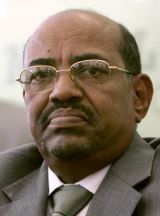Activists try Sudan president over Darfur at mock tribunal
Nov 14, 2006 (UNITED NATIONS) — A group of human rights activists convened a mock tribunal Monday to try and convict President Omar al-Bashir of Sudan of war crimes, crimes against humanity and genocide in Darfur.
 The group, Judgment on Genocide, hoped to bring increased attention and urgency to the violence in the war-torn region of Darfur.
The group, Judgment on Genocide, hoped to bring increased attention and urgency to the violence in the war-torn region of Darfur.
“From the ICC point of view, this is almost a dress rehearsal,” said Elvir Camdzic, trial director and co-founder of a San Francisco-based Darfur group. Camdzic was referring to the International Criminal Court, the Hague, Netherlands-based permanent tribunal set up in 2002 to prosecute genocide and war crimes, which is not affiliated with the mock tribunal.
About 200,000 people have been killed and 2.5 million displaced in Darfur since February 2003, when ethnic African rebels rose up against the Arab-dominated government in Khartoum. Many in the international community have accused Sudan’s government of raising and equipping the janjaweed militia of Arab nomads to crush the uprising.
A Security Council resolution has called the crimes in Darfur “crimes against humanity,” and the United States has labeled them genocide. Last year, the U.N. Security Council approved a resolution to refer all cases of Sudanese war crimes to the ICC.
The Sudanese government has denied backing the janjaweed and has refused to allow the U.N. to take over for African Union forces that now patrol the region.
The tribunal invited al-Bashir to mount a defense but received no response from the Sudanese government, so it appointed defense attorneys to represent him.
No one at the Sudanese mission to the U.N. could immediately be reached for comment on the mock proceedings.
Wole Soyinka, a Nigerian writer and Nobel laureate, presided over the tribunal, which was composed of doctors, lawyers and academics who have experience in international law and have worked to publicize the atrocities committed in Sudan.
Three Sudanese testified that their villages had been burned and their friends and neighbors killed by men they identified as janjaweed. Both the Sudanese and experts who have worked in the country said the janjaweed attacks were supported by the Sudanese army.
Jarannabi Abbas Ageed, a 22-year-old Sudanese student, described fleeing an attack on his village. “The most overwhelming feeling is that you’re going to lose your life,” he said, speaking in Arabic through a translator.
Ageed brought a picture of a friend he said had seen shot in front of him. He identified the attackers as janjaweed militiamen.
“They attacked us because they wanted to replace us; they wanted to live in our land,” he explained.
Ageed was the only witness who gave his name; the others requested anonymity.
(AP)
